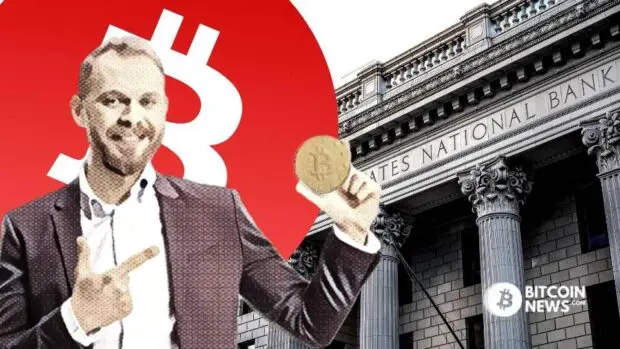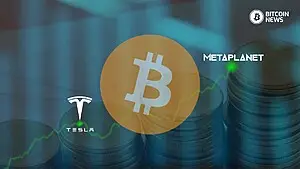According to Peter Rochel, German management consultant and keynote speaker at the Bitcoin Konferenz in Innsbruck, Austria, banks are underestimating the impact of bitcoin.
“Decision-makers among banks do not understand the impact of bitcoin adoption on the business model of banks. A misjudgment with fatal consequences.”
Since 2019, Rochel has been investigating the causal mechanisms of Bitcoin mass adoption on the basis of the Jobs to Be Done theory and the Theory of Disruption. This affects employees and managers in financial institutions and of course their clients.
At the bitcoin conference in Austria, attendees of the industry day will have a chance to go in-depth with the discussion around bitcoin and banking. On Thursday September 15 the 10.50AM keynote by Peter Rochel is titled “Why Bitcoin is Essential for Banks to Survive” and is directly addressed towards the banking industry in the DACH region (Germany, Austria, Switzerland).
German banks could be first to adapt bitcoin strategies following news reports in recent years.
Back in 2019 Bavarian bank “Bayern LB” issued a report discussing bitcoin as a hard asset and comparing the stock-to-flow ratio of gold and bitcoin. The bank’s predictions that bitcoin would trade in the $90,000 – $250,000 range in 2021 weren’t met.
Regardless, in today’s volatile economic environment bitcoin could indeed be a valid hedging strategy for banks.
Economist and banking insider Markus Krall expects a fatal banking crisis to happen rather sooner than later:
The banks’ problem: 80% of a commercial bank’s income comes from interest margins. But the ECB’s zero-interest-rate policy no longer allows for margin profits.
“At some point, banks’ earnings have fallen to the point of crisis,” says Krall.
The zero-interest-rate policy has destroyed the banks’ earnings base, he said. “The interest margin continues to erode, so that the banks, which cannot earn money in the long run, also do not provide credit.”
Markus Krall expects a severe banking crisis to break out as early as next year, which will also burst the bubble in the real estate markets.
“We have to expect that a very large number of banks will be operating in the red.” This will lead to a credit crunch, which will also drive companies into crisis and bankruptcy, which until now have only been able to stay afloat on the basis of cheap loans.”
This, in turn, will put additional strain on the banks: “This shock will be hard and trigger further chain reactions,” says Krall. “Once it starts, it will happen very quickly, because the wave of bankruptcies will keep hitting new areas, causing banks to topple and destroying confidence in economic performance. That can mean panic like we saw after Black Friday.”
Krall continued, “We are talking about the crash here.” Then, he said, the single currency is also facing its end: “If this thing leads to big inflation, the euro will not survive this crisis.”
But can the German banking sector easily jump on Bitcoin as an alternative?
As of 2020, following the latest AML directives, German banks are allowed to take custody of bitcoin and other digital assets.
However, the German regulatory landscape under the strict rule of Bafin has not been to easy to deal with for exchanges and businesses. While France approved an exchange license for Binance, Germany kicked them out.
For consumers and bitcoin holders, though, Germany is the place to be as there has never been a capital gain tax imposed on bitcoin.
How dynamic is the German bitcoin banking sector?
With Bitcoin.de a German bitcoin exchange and peer to peer market exists since 2011 and is recognized as a small but reliable player. Bitcoin.de has partnered with banking-as-a-service provider Fidor Bank.
Further, the stock exchange of Stuttgart incubated a bitcoin trading app under the name Bison.
German Volksbank Bayern Mitte already offers financial advice around bitcoin and even sells bitcoin hardware such as cold storage wallets to interested clients.
One of the largest German banking groups “Sparkasse” made the news last year when it announced to launch an in-house bitcoin wallet and exchange.
A spokesperson for the German Sparkassen Verband answered a request by Cointelegraph, stating: “More and more consumers are interested in crypto-assets. One in ten customers of the German Savings Banks states he/she owns or has owned crypto-assets. Considering their expectations, the Savings Banks Finance Group has to look into crypto-assets, too.”
Earlier this year in May, German Commerzbank CEO Manfred Knof commented the bank is seeing “increasing customer demand” for digital assets and wants to “gradually develop the service of custody of cryptocurrencies” and offer other related services in the future.
The bitcoin konferenz in Innsbruck aims to provide a forum to network and exchange ideas. Meeting industry peers, brainstorming and shaping the future of what many believe will be a multi-billion dollar (bitcoin) industry in a few years.










